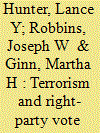|
|
|
Sort Order |
|
|
|
Items / Page
|
|
|
|
|
|
|
| Srl | Item |
| 1 |
ID:
182533


|
|
|
|
|
| Summary/Abstract |
The purpose of this study is to understand how countries have leveraged on their economic resilience to fight the COVID-19 pandemic. The focus is on a global sample of 150 countries. The study develops a health vulnerability index (HVI) and leverages on an existing economic resilience index (ERI) to provide four main scenarios from which to understand the problem statement, namely ‘low HVI-low ERI,’ ‘high HVI-low ERI,’ ‘high HVI-high ERI,’ and ‘low HVI-high ERI’ quadrants. Countries that have robustly fought the pandemic are those in the ‘low HVI-high ERI’ quadrant and, to a lesser extent, countries in the ‘low HVI-low ERI’ quadrant. Most European countries, namely one African country (Rwanda), four Asian countries (e.g., Japan, China, South Korea, and Thailand), and six American countries (e.g., United States, Canada, Uruguay, Panama, Argentina, and Costa Rica) are apparent in the ideal quadrant.
|
|
|
|
|
|
|
|
|
|
|
|
|
|
|
|
| 2 |
ID:
182535


|
|
|
|
|
| Summary/Abstract |
The following study analyzes the exercise of power by both the United States and China in their confrontation for hegemonic dominance. Through observational and qualitative methods, an examination of the mechanisms underlying China's strategic statecraft and how it implements its exercise of power reveals its genesis and how it contested and controlled the order in Southeast Asia. Navigating through economic indicators, the research determines that the decline of American power is a myth, but it establishes a decline in its influence and prestige arising from its strategic and tactical choices. The study identified multiple systemic contingencies and political irrationalities for the non-realization of systemic unipolarity, resulting in a nonpolar world. It concludes that neither the incomparable military power of the United States nor the greater economic power of China has, in the contemporary world, fundamental comparative advantages for achieving systemic hegemony.
|
|
|
|
|
|
|
|
|
|
|
|
|
|
|
|
| 3 |
ID:
182512


|
|
|
| 4 |
ID:
182530


|
|
|
| 5 |
ID:
182534


|
|
|
|
|
| Summary/Abstract |
In recent years, hate groups have increasingly attracted public attention while at the same time escaping the purview of scholars. Although overt prejudiced attitudes have lost public support in recent decades, hate group and hate-group activity has remained relatively consistent. What, then, explains the enduring power of hate? I argue that hate groups have arisen in reaction to the loss of social capital, particularly in regard to rural and exurban communities. Using county-level suicide rates as a proxy for the loss of social capital, I test this theory using data from the lower 48 states from 2010 to 2019. I find that each 5.38 percent increase in suicide rates is associated with 1 additional hate group forming. These findings highlight the importance of examining quality-of-life in understanding far-right activity, and challenge previous findings with regard to rurality and hate.
|
|
|
|
|
|
|
|
|
|
|
|
|
|
|
|
| 6 |
ID:
182532


|
|
|
|
|
| Summary/Abstract |
This study examines the electoral consequences for ideologically right-leaning political parties in the wake of terrorist attacks by employing an original dataset that captures political party vote shares and multiple terrorist indicators. Our analysis extends the partisan voting hypothesis to 56 democracies from multiple regions and levels of development between 1975–2014. Specifically, we find that the origins of terrorist perpetrators, the severity of terrorist attacks, and the frequency of terrorist incidents decrease right-party vote shares in legislative contests when incorporating standard controls. All told, these findings reinforce political psychological reasoning that contends terrorist attacks impact citizens’ emotions and voting calculations.
|
|
|
|
|
|
|
|
|
|
|
|
|
|
|
|
| 7 |
ID:
182531


|
|
|
|
|
| Summary/Abstract |
In the aftermath of the global COVID-19 crisis, whereas many world leaders enacted swift lockdown orders and robust testing regimes to preserve public health and to speed up economic recovery, Donald Trump in the United States and Jair Bolsonaro in Brazil responded to outbreaks by publicly downplaying the significance of the crisis and argued that overly restrictive health measures would create too sizable an economic risk. These two presidents have done much to weaken democracy and trust in government. In this article, we examine the extent to which two institutions in each country––federalism and the party system––impacted the ways in which they framed the COVID-19 crisis and policy responses to it in 2020, especially during the first months of the pandemic. Our evidence suggests that each of these institutions provided opportunities for both leaders to reconstruct public understandings of the crisis while deflecting blame for negative public-health outcomes.
|
|
|
|
|
|
|
|
|
|
|
|
|
|
|
|
|
|
|
|
|